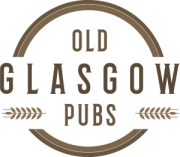42 Hospital Street, Gorbals, Glasgow. G5. Demolished.
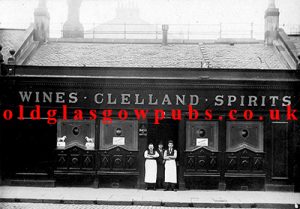
The Clelland Bar, with James Clelland in the centre with two barmen. 1930s.
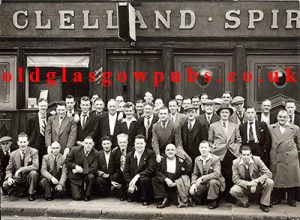
This image was taken on a Sunday when the pubs were closed. The group of the Clelland Bar customers, Staff and friend on their way to the coast for their annual holiday. 1954.
The Clelland’s bar was established by James Clelland in 1919. James was born in Glasgow of which he was the eldest of a large family. His father also James ran a public house at 29 Hydepark Street. James worked with his father at the age of 13, but within a few years left to serve his apprenticeship as an engineer with Napiers, at the same time he would work evenings and Saturday afternoons serving behind his fathers bar. On completion of his apprenticeship, he had little experience of engineering in Edinburgh and returned to Glasgow. He went back to the licensed trade as charge hand for Archibald Wilson in his Stobcross Street establishment.
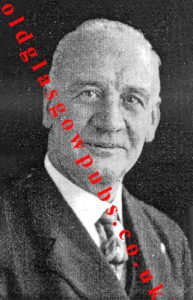
James Clelland. 1950.
He then went into training in an accountant’s office followed by charge hand of Mrs Cringle’s pub, The Taylor’s Clipping’s, an old established pub situated in Sydney Court, Argyle Street.
On the outbreak of the war, Mr Clelland served as an engineer in Harland and Wolfe’s engineering works and was never marched abroad, his talent and abilities were considered more valuable here. He remained with the firm until 1919, at which time he was shop steward for the firm, he then bought premises at 42 Hospital Street, Gorbals and turn them into licensed premises, The Clelland Bar.
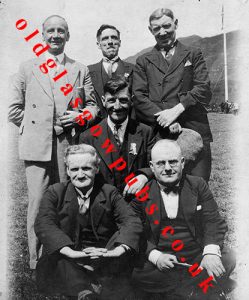
Mr James Clelland in the light suit with other Glasgow publicans in the 1940s. Do you know anyone in this image?
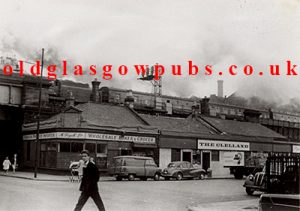
The Clelland. 1960s
Two and a half years later he acquired from Mr John Kennedy the public house at 22 Paisley Road West, the Viceroy Bar. In 1936 James became a director of the Glasgow Licensed Trade Defence Association. Mr Clelland’s three brother’s were also connected with the licensed trade and a fourth passed away in 1937.
On September 14th 1939, it was announced by the Licensing Court that all pubs and licensed premises in the city of Glasgow would close at 8pm until further notice. Hours of conducting business would be from 11.30am till 2.30pm and from 5pm till 8pm on Mondays to Fridays and on Saturday from 10am till 12 midday and from 4pm till 8pm. This was a short term arrangement and the pubs were soon back to the usual hours on trading.
In his spare time Mr Clelland was a supporter of Queen’s Park F.C.
His son James Clelland Jun. took over the licence for Hospital Street until 1959 and gave up the trade to settle in California with his wife and family. He was then secretary of the Gorbals Ward Association. The pub was then taken over by Jessie H McLintoch. The last licensee to hold the certificate was John Ross Rawley, the pub was finally demolished in the City Council’s redevelopment plans for the Gorbals in the 1970s.
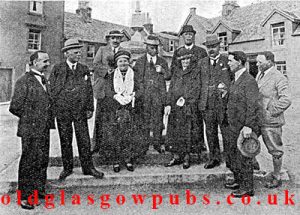
Gorbals local Veto Defence Association trip to Largs. 1924.
In the photograph above is Mr & Mrs John Holmes, 26 Bedford Street,Mr & Mrs William Keith, 62 Main Street, Gorbals and 62-64 Thistle Street, Mr Francis P McAvoy, 196 Rose Street, Mr Peter Kernan, Mr J J Gallagher, Mr James Clelland, Mr McDonald, assistant organiser and Mr McLeod, Treasurer.
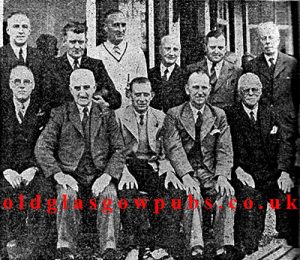
Royalty Burns Bowling Club. 1944. Back row James Brown, Dan McCrudden, Alick Hall, James Clelland, Donald Kennedy and J W Thomson, Front row Alick Dickson, Duncan Menzies, Willie MacFarlane, Willie Anderson and John Holmes.
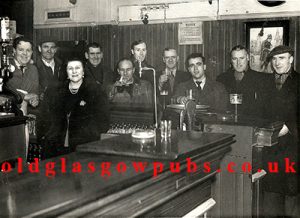
Mrs Margaret Clelland standing behind the bar with some of the customers. This photograph was taken just after World War 2.
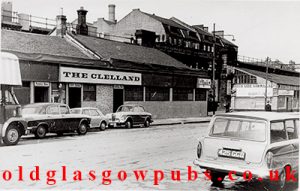
Another view of the Clelland Bar. 1960s.
In the News 1972…
There are quite a lot of interesting things happening in the Clelland Bar in the Gorbals these days.
For many years owner John Rawley concentrated on the group scene. Which was fine, if you could stand the noise. Now he has an 11 o’clock licence and has installed a dancer floor.
Tonight and tomorrow they are having a dinner-dance type of entertainment with singer Matt McGowan on stage. Backing is by the Pete Fardy Trio, which should keep things nice and relaxed.
Entertainment is featured most nights in the week, with the emphasis on variety. The menu is fairly basic – steak, chicken, fish, etc. As John says – “We just don’t have the facilities to put on an extensive a la carte menu, but what we have is of the best.”
In the News 1972…
The Clelland Bar in Gorbals has been turning into a licensed restaurant, owner John Rawley tells me that he intends featuring cabaret most evenings. He is also about to start a talent contest on Saturdays at lunchtime with a total prize money of £100. Those interested should contact him.
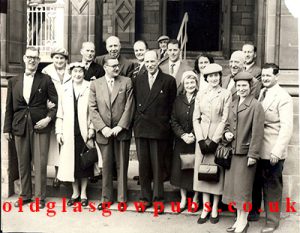
This image was taken at Rothesay in the 1950s. The occasion was with the Glasgow Licensed Trade Association outing and was greeted with Rothesay Provost Frank Munro.
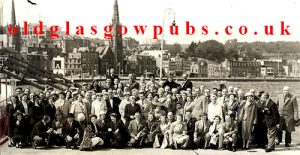
This image was taken during the Gorbals Ward Licensed Trade day trip to Rothesay 1950s.
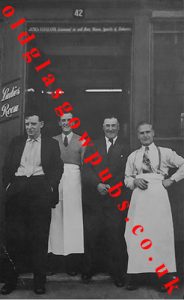
Outside the Clelland Bar. Do you know anyone in this image?
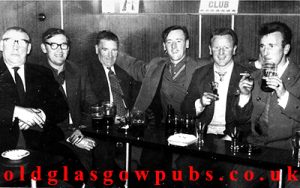
All the men in this image are from the same family “The Birrell’s.” Thanks to Steve Birrell.
In the NEWS 1978…
Thieves Get £1500 in Raid On Pub…
Raiders escaped with about £1500 and a large haul of spirits early today from the Clelland Bar, 42 Hospital Street, Gorbals, Glasgow.
The thieves got in by cutting a hole in the roof of the public house which, because of demolition of surrounding property, stands alone. Police foiled thieves who were escaping with a huge quantity of cigarettes and liquor from premises in the Dixon Blazes industrial estate.
They were spotted by a policeman who raised the alarm. In their bid to escape the thieves dropped the cartons of whisky they were carrying and almost all of the 100,000 cigarettes.
In the NEWS 1979…
Fears That Haunt A Pub…
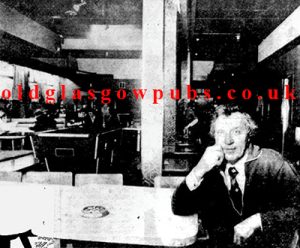
John Rowley sits in an empty lounge. 1979.
Fear of sectarian violence is turning customers away from a bomb-blasted pub on Glasgow’s South Side.
But the pub owner, John Rowley, said today: “The Clelland Bar is no sectarian pub.”
And he said there was no reason to worry about more trouble. “I wouldn’t have my wife and kids in here if I thought the place wasn’t safe.” he said.
CANCELLED
Mr Rowley was speaking six days after his public bar was wrecked by an explosion with seven people taken to hospital.
The pub’s lounge bar, on the corner of Ballater Street and Hospital Street, was unaffected by the explosion.
But the normally packed room is staying half empty for much of the day and cabaret nights, featuring acts like comedian Helen Randell, are being threatened by cancellations.
Speaking in the big lounge with only a handful of youths playing pool, Mr Rowley said: “Business is definitely suffering. But it’s not just a question of money.
“It’s the fact that the place is being talked about as a sectarian pub and people are phoning up to cancel nights out here because they think they’ll be drawn into a religious feud.
Following last weekend’s explosion at the pub, 15 men have been detained by police under the Prevention of Terrorism Act.
In the NEWS 1979…
Pub Blast after a Sherry Man Left…
A Glasgow barman told a terrorist trial today about the night a sherry drinking stranger with a bag over his shoulder left his pub minutes before it was ripped apart by an explosion.
There were two strangers in the Clelland Bar in Hospital Street, Gorbals, that night, and their drinking habits attracted attention.
The first drank sherry and pints of beer, The other quickly drank two pints of lager then left.
Shortly afterwards an explosion wrecked the pub and injured customers. Barman Patrick Defelice (32) told the jury at Glasgow High Court that the sherry drinking stranger was one of the accused, Angus McKenna.
McKenna is one of 11 men charged with plotting to further the cause of the outlawed Ulster Volunteer Force and with bombing three Glasgow pubs.
PAPER
The other 10 accused are Stewart Ross, William Campbell, George Martin, John Thomson, Colin Campbell, Peter Duffy, Robert Kane, Alastair Von, George Menzies, and John Pears.
Mr Defelice told Advocate-depute William Prouser., Q.C., that the Clelland Bar was not a sectarian pub.
“It has nothing to do with religion. It’s just a group of young boy’s” he said.
On Saturday night, February 17, this year the pub was quiet. Mr Defelice said he knew most customers by name or face for they were regulars. But two men were strangers. They did not talk to each other or drink together.
Mr McKenna, he said, came in after nine and asked for a paper. But Mr Defelice told him it was not that night’s Times. Mckenna had a sherry served in a whisky glass because it was an unusual order for the Clelland, He also had a pint of beer.
“He was carrying something over his shoulder. I noticed that it was a bag on a strap.” McKenna, he said, had three sherries and was in the bar for more than half an hour. He strolled across to watch the guys playing at the pool table and also had a look at the juke box.”
Speed
The witness said McKenna left about 9.45 p.m. and the explosion came 20 minutes later. Mr Defelice said he could not identify the second stranger in court because he did not get a good look at him in the bar.
But another barman had commented on the speed of his drinking. “He had a couple of pints of lager. I served him a pint and the other barman served him a pint.
Mr Defelice said he was standing talking to the bar owner, 48-year-old John Rawley when the explosion happened.
“I just remember a bang, everybody was running about I was thrown forward.”
In the NEWS 1979…
15 HELD in DAWN RAIDS AFTER PUB BLASTS…
Fifteen men were being held in custody by Strathclyde Police last night following two bomb blasts in public houses in Glasgow on Saturday night.
They were arrested by armed members of the Special Branch and Strathclyde serious crime squad yesterday in dawn swoops in various parts of Glasgow.
The men can be held for 48 hours under the Prevention of Terrorism Act and police can then apply to the Secretary of State for Scotland to hold them without charge for a further five days.
Police confirmed yesterday that explosive devices were used in the blasts, and they believed they were related and were the work of an extremist group.
WARNING
The incidents brought a warning to the public from Chief Constable Patrick Hamill of Strathclyde Police to “display the utmost vigilance in licensed premises for any suspicious package, parcels, hold-all or the like which is unattended.”
In this statement, Mr Hamill said: “Management and staff of Licensed premises, and in all instances where suspicious objects or articles are observed the police should be noticed immediately.”
Police inquiries into the blasts, at the Old Barns public house in London Road, Calton and the Clelland Bar, Hospital Street, Gorbals, were continuing last night, and a special mobile police station was set up outside the Clelland Bar.
Another pub that was nearly blown up was Treanor’s Bar in Cathcart Road.
The bomb in the Old Barns public house went off in a lounge bar, which is being redecorated. No one was injured. In the Clelland Bar, however, five people were treated in hospital for cuts caused by glass from the juke box, fruit machine, and windows, and a hole was blown in the floor.
APPEAL
The licensed trade last night backed up the chief constable’s appeal to the public. A spokesman said: “We want people to co-operate fully with the police. Anyone who sees anything remotely suspicious should tell the bar staff to contact the police, even if it does turn out to be innocent.”
Neither of the bars involved in the blast is sectarian, but those arrested are believed to have connections with the Ulster Defence Association.
Two week ago at Paisley 24 men, believed to be associated with the UDA, were charged under the Prevention of Terrorism Act. Police are believed to have taken possession of weapons and explosives during raids on houses in Ayrshire and Renfrewshire.
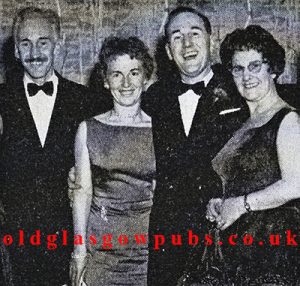
Left to right Mr Young of Usher’s, Mrs & Mr J Clelland Jun., and Mrs Young. Mr & Mrs J Clelland is leaving the Licensed Trade to settle in California. 1959.
Do you remember this old Pub? If so please leave a comment.
END.
